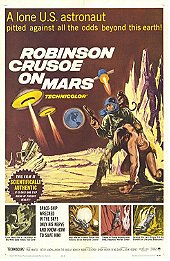As originally conceived, Robinson Crusoe on Mars was set be another disposable and ludicrously cheap/camp piece of sci-fi film-making from the 60s. Man gets stranded on Mars, fights all sorts of strange lizard monsters, befriends friendly comedic sidekick alien character, and becomes great liberator. It would have far more in common with its decade B-movie brethren than the final product, which functions as something of an intelligent dry-run for something as audacious as 2001: A Space Odyssey in its brightest moments.
Robinson Crusoe on Mars is primarily a survivalists tale and incredibly scientifically accurate for what was known or hypothesized about Mars by 1964. There’s an air of authenticity and verisimilitude to the first half that’s most engaging and dynamic. Think of it as Cast Away Goes Cosmic in a sense. These changes created a film that rewards patience and finds the dynamic qualities of silence, until the inclusion of a character dubbed Friday (Victor Lundin) turns into more action-adventure spectacle that’s fairly common for the genre, especially around this era.
Prior to that, there’s a suffocating atmosphere of isolation and desperation for survival with Paul Mantee’s Commander Kit Draper struggling to find consistent sources of shelter, air, water, and food. Friday’s inclusion adds wrinkles and complications that the narrative simply cannot hold. Friday is a slave that Kit rescues from his oppressors, and they go on a mad dash across the Martian terrain in the final act. This entire sequence adds a certain coded racial element that may be well-intentioned but is clunky and uneasy in a thematic sense.
Robinson Crusoe on Mars’ sense of propulsion and urgency completely changes in this section, and the more deliberate pacing is gone in favor of high octane thrills. Personally, I found the man-against-nature sections more engaging and artistically rewarding. Given the age and general B-movie qualities on display here there can be a certain flavor of camp involved, but there’s also a clear-eyed determination and a serious treatment of the science and theories involved. There’s also the pervasive sense that the attacking aliens here have a strong, near copycat quality to the ones found in 1953’s The War of the Worlds. Not entirely surprising considering both films were helmed by the same man, Byron Haskin, but it does give a general feeling sameness once they arrive that takes some of the menace out of them.
Still, for all of the problems, mainly boiling down to its ambitions exceeding its grasp, Robinson Crusoe on Mars is worth seeking out for its wide-eye sense of wonder and general sense of awe in the mysteries of the unknown. It’s refreshing to watch a science-fiction tale that is steeped in warmth, vitality, and a quest for smarts instead of action-adventure spectacle with little going on between the ears. Think of it as the next progression after Forbidden Planet took the first newborn steps towards making science-fiction a serious artistic contender in film medium.
 Login
Login